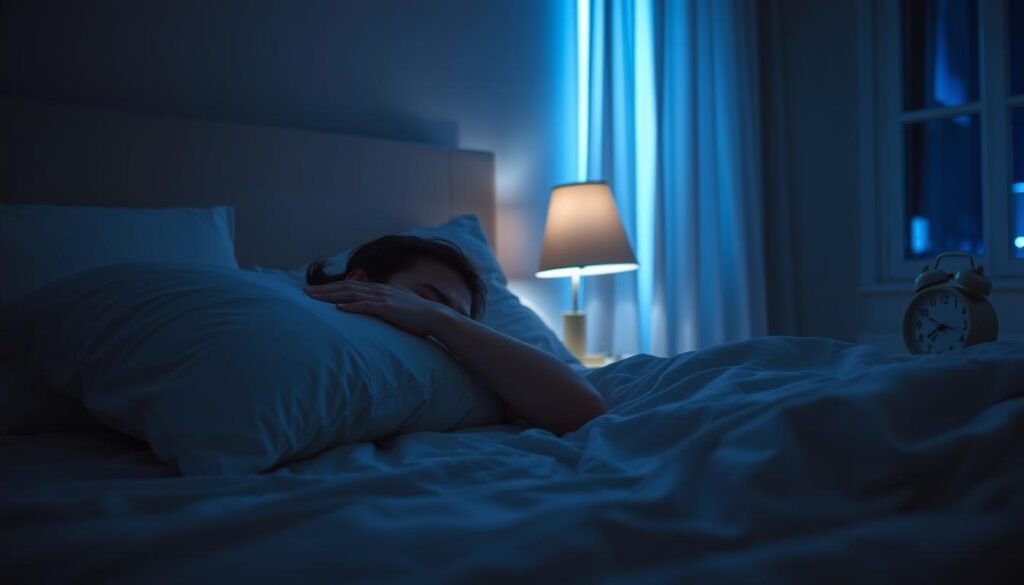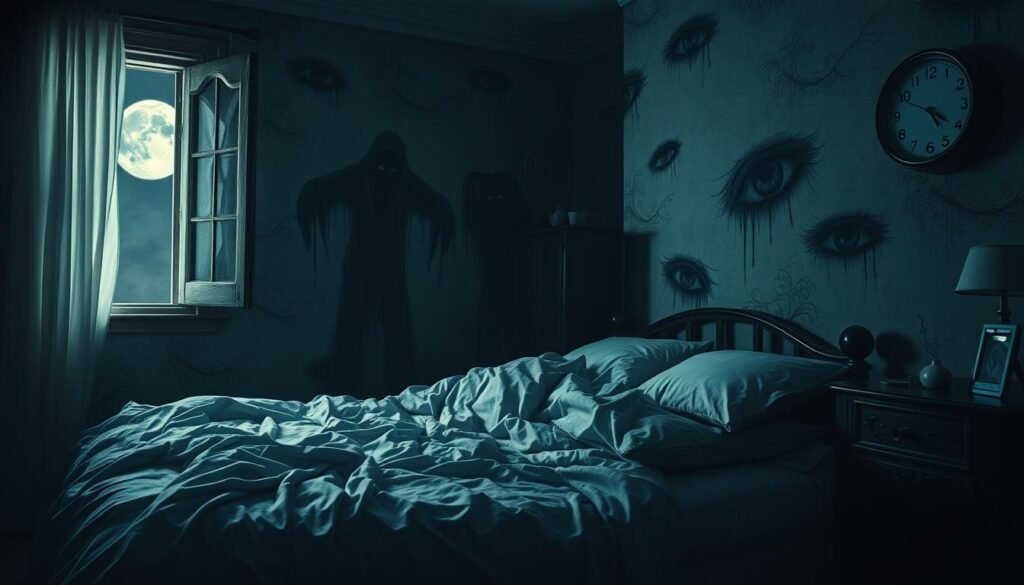About 25 million people across the U.S. face sleep apnea daily. This disorder greatly affects one’s physical and mental health. Research shows a strong link between sleep apnea and rising anxiety levels. These findings push us to look deeper into how these conditions might worsen each other. Also, they make us wonder how treating one can help improve overall health.
The bond between sleep troubles like obstructive sleep apnea (OSA) and anxiety is deep. Those with OSA often feel more anxious. This is especially true for those with severe sleep apnea, which can make mental health worse. Millions are caught in this interplay, making it vital to see how treating sleep apnea can lessen anxiety. Also, tackling both issues together could lead to better, more whole health solutions. For more info, read about how they interconnect here.
Key Takeaways
- Around 25 million people in the U.S. have sleep apnea, revealing its widespread impact on health.
- There is a strong correlation between sleep apnea and anxiety, with many individuals experiencing heightened anxiety symptoms alongside their sleep disorder.
- Engaging in effective treatments for sleep apnea can simultaneously help alleviate anxiety symptoms, creating a pathway to better mental health.
- Personalized treatment plans that consider both sleep apnea and anxiety are essential for improving overall patient outcomes.
- Lifestyle changes, including improved sleep hygiene and stress management techniques, significantly aid in managing both conditions.
Introduction: The Overlap Between Sleep Apnea and Anxiety
Anxiety and sleep apnea often occur together, affecting a person’s mental health and lifestyle. Studies link sleep issues from apnea to higher anxiety. Many people with obstructive sleep apnea (OSA) feel anxious.
Research finds that 53.9% of OSA patients also have anxiety. The more severe the apnea, the higher the anxiety levels.
The relationship between sleep apnea and anxiety is intricate. Those with severe OSA are more anxious. They complain about poor sleep and tiredness. Anxiety is a common issue for them.
Sleep apnea symptoms like choking worsen this anxiety. This cycle makes life harder.
Knowing how sleep apnea and anxiety mix is key. Sleep apnea impacts sleep and increases anxiety and depression. Recognizing this helps improve treatment and mental health.
Understanding Sleep Apnea
Obstructive sleep apnea (OSA) is a common sleep disorder. It causes repeated breathing pauses during sleep because the airways are blocked. Almost 22 million Americans have this condition, which can lead to serious health problems. People with obstructive sleep apnea often face severe breathing difficulties.
These difficulties can mess up the natural sleep cycle and hurt overall health. Understanding OSA helps us see its big effect on mental health. This is especially true for people who also deal with anxiety disorders.
What is Obstructive Sleep Apnea?
Obstructive sleep apnea happens when throat muscles relax too much, briefly closing the airway. This can cause a lot of health issues beyond just sleep problems. If not treated, it can lead to heart attacks and accidents. It impacts daily life, causing tiredness and lack of sleep. This can make mental health problems worse.
Common Symptoms of Sleep Apnea
It’s important to know the common symptoms of sleep apnea for early treatment. Symptoms include:
- Loud snoring
- Gasping or choking during sleep
- Excessive daytime sleepiness
- Insomnia or trouble staying asleep
- Morning headaches
- Poor concentration and memory issues
People with obstructive sleep apnea may feel more anxious. They’re also likelier to have panic attacks due to lack of good sleep. Research shows a clear connection between sleep apnea and more panic attacks. This highlights how managing sleep disorders is key for good health and wellbeing.

| Symptoms | Related Effects |
|---|---|
| Loud snoring | Disruption of sleep for both the individual and bed partner |
| Gasping or choking | Increased anxiety and panic |
| Excessive daytime sleepiness | Impaired daily functioning and risk of accidents |
| Insomnia | Compounding mental health issues, including anxiety |
| Poor concentration | Negative impact on work and personal life |
Understanding Anxiety Disorders
Anxiety disorders include many mental health problems. They bring strong fear and distress. These feelings can make daily life hard. People with anxiety often feel many anxiety symptoms. These can cause confusion and discomfort. Knowing about these conditions helps us understand their complexity. It shows how they connect to other issues like sleep apnea.
What Are Anxiety Symptoms?
Some common anxiety symptoms are:
- Excessive worry or fear
- Restlessness and agitation
- Difficulty concentrating
- Sleep disturbances
- Irritability and feelings of dread
These symptoms can impact mental health a lot. They can harm life quality. If anxiety stays, it might lead to other health problems. So, it’s key to deal with these issues quickly and well.
Different Types of Anxiety Disorders
There are many anxiety disorders, all with their own issues. Some common ones are:
- Generalized Anxiety Disorder (GAD) – Comes with long-term worrying.
- Panic Disorder – Causes sudden terror attacks.
- Social Anxiety Disorder – Brings fear of social settings.
It’s important to know these disorders. Many people have symptoms that are like mood disorders, including depression. This can make finding the right diagnosis and treatment harder. Healthcare workers need to understand all a patient’s symptoms.

How Sleep Disorders Affect Mental Health
Understanding the link between sleep and mental health is key for those with sleep disorders. Sleep is crucial for emotional balance. It helps the brain process day-to-day experiences and deal with stress. Since disrupted sleep, like what you see with sleep apnea, impacts mental health greatly.
The Role of Sleep in Emotional Regulation
Good sleep is vital for controlling our emotions. Not sleeping well can make us feel more unstable emotionally. Without enough sleep, people find it hard to handle their feelings, leading to more anxiety. The impact of not sleeping enough is significant. It leads to a vicious cycle where anxiety makes sleep problems worse.
Sleep Deprivation Effects on Anxiety
Not sleeping enough can really increase anxiety. Research shows that those with untreated sleep apnea are almost four times more likely to develop anxiety disorders. This fact shows us how crucial it is to treat sleep disorders to maintain mental health. Lack of sleep and anxiety feed off each other, making each other worse.

| Condition | Increased Odds of Mental Health Issues |
|---|---|
| Untreated Sleep Apnea | Anxiety: 3.68 times Depression: 3.11 times Severe Psychological Distress: 2.88 times Suicidal Thoughts: 2.75 times |
| Chronic Sleep Deprivation | Increased emotional instability and anxiety symptoms |
Improving sleep quality can reduce sleep deprivation effects and help control emotions better. By knowing the risks of sleep disorders, people can work towards improving their mental health.
Evidence of the Link Between Sleep Apnea and Anxiety
To understand the link between sleep apnea and anxiety, we look at research. Many studies find a big overlap between these two issues. They show how sleep apnea might make anxiety worse.
Research Studies Supporting the Connection
Lots of research points to a link between anxiety and sleep apnea. About 22 million Americans struggle with sleep apnea, and 80% don’t know they have it. Recent studies from 2020 found treating sleep apnea can help with anxiety. This means getting the right diagnosis is key.
People with anxiety and sleep apnea often feel mentally foggy. This fog can make it hard to handle stress daily. It’s important to pay attention to these signs.
Statistical Relationships in Patients
Looking at the numbers, we see how common both conditions are. Anxiety disorders affect over 40 million adults in the U.S. They are the most common mental health issue. Sleep apnea touches about 10% of the U.S. population, which is around 326 million people.
People with obstructive sleep apnea often feel more anxious than others. A lot of them also show signs of depression. This highlights the importance of understanding the link between sleep apnea and other mental health issues.
| Condition | Prevalence in Population | Link to Anxiety |
|---|---|---|
| Sleep Apnea | 10% of the U.S. population | Higher anxiety rates and co-morbidities |
| Anxiety Disorders | Over 40 million adults | Often misdiagnosed or untreated |
| Undiagnosed Cases of Sleep Apnea | 80% annually | Increased risk of anxiety and related disorders |
The research and numbers stress the need to tackle the anxiety and sleep apnea link. Getting the right diagnosis and treatment is crucial for well-being.
Can Sleep Apnea Cause Anxiety
Understanding sleep disorders and mental health’s connection is crucial. This is especially true for can sleep apnea cause anxiety? Many people deal with these issues together. This situation complicates their health and happiness.
In the U.S., anxiety is the top mental health problem. It affects about 20% of adults. Symptoms can be mild or severely upset daily life. Around 43% of people say anxiety mildly bothers them. Yet, 23% face severe troubles because of it.
Those with obstructive sleep apnea often see higher rates of anxiety. They are more prone to other mental health issues, too. For example, panic disorder and depression. These conditions together can make anxiety worse. This makes it hard to live well. Anxiety can ruin sleep. Bad sleep can make sleep apnea symptoms worse, too.
- Nearly half of those with depression also deal with anxiety.
- Above 90% of veterans with PTSD suffer sleep problems.
- Sleep apnea can increase anxiety, making problems bigger.
The link between anxiety symptoms and sleep apnea still needs more study. Doctors stress the importance of early diagnosis and care. Treating sleep apnea and anxiety early can stop them from getting worse. This approach helps treat both issues together.
| Disorder | Prevalence in Adult Population | Impact on Daily Life |
|---|---|---|
| Anxiety Disorders | 20% | 43% mild, 33% moderate, 23% severe impairment |
| Generalized Anxiety Disorder | 3.1% | Common anxiety symptoms |
| Panic Disorder | 2.7% | Severe anxiety crises |
| Social Anxiety Disorder | 7.1% | Interference with social activities |
| Specific Phobias | 9.1% | Affects daily decisions |
| Obsessive-Compulsive Disorder | 1.2% | Can disrupt everyday routines |
| Post-traumatic Stress Disorder | 3.6% | Associated with insomnia |
The Bi-Directional Relationship Between the Two Conditions
Anxiety and sleep apnea interact in complex ways. This connection is key to finding effective management strategies.
How Anxiety Can Worsen Sleep Apnea
Anxiety affects sleep apnea by tightening muscles and causing restless thoughts. This worsens sleep apnea, making it hard to sleep. The cycle of poor sleep increases anxiety, including worry and irritability.
The Vicious Cycle of Sleep and Anxiety
Sleep disorders and anxiety feed into each other. Sleep apnea interrupts breathing, causing cognitive problems and more stress. Anxiety can lead to behaviors that disrupt sleep even more.
Changing your lifestyle is important in breaking this cycle. Keeping a regular sleep schedule, exercising, and using stress-reducing practices helps. These steps improve sleep and lower anxiety.
| Factor | Impact on Sleep Apnea | Impact on Anxiety |
|---|---|---|
| Increased muscle tension | Can lead to airway obstruction | Raises stress levels |
| Racing thoughts | Disrupts ability to fall asleep | Promotes excessive worry |
| Teeth grinding (bruxism) | Can worsen airway blockage | Contributes to subconscious stress |
| Oxygen deprivation | Leads to cognitive disturbances | Increases emotional reactivity |
Treatment Options for Sleep Apnea
When looking into sleep apnea treatments, many options exist to help lessen symptoms and boost well-being. Patients may try CPAP therapy, oral appliances, and making lifestyle changes. Each method is designed to improve sleep and reduce anxiety.
Continuous Positive Airway Pressure (CPAP) Therapy
CPAP therapy is a top choice for obstructive sleep apnea. It uses a device to keep airways open while sleeping. Research shows that both short and long-term CPAP use can greatly better life quality for those with OSA and related mental health issues. However, some might feel more anxious at first, needing close watch and adjustments.
Oral Appliance Therapy as an Alternative
For those who don’t like CPAP, oral appliance therapy is another route. It uses custom devices to stop airway blockage. Tools like MADs are proving effective for better sleep breathe, offering another treatment avenue.
Lifestyle Modifications to Improve Sleep
Changing your lifestyle can also boost other treatments’ success. Suggested shifts include:
- Keeping a healthy weight to ease airway pressure
- Regular exercise to lift energy and mood
- Good sleep habits for improved sleep quality
- Steering clear of alcohol and sleep-harming substances
These lifestyle tweaks are key in controlling sleep apnea and anxiety. Using these strategies together, one can aim for better sleep and mental health.
Treating Anxiety Alongside Sleep Apnea
It’s key to address anxiety when dealing with sleep apnea to improve well-being. Cognitive Behavioral Therapy (CBT) is an effective way to treat anxiety. It helps change the negative thoughts that make anxiety worse. Studies show that CBT can greatly help patients. Some even see a big boost in their mental health after regular therapy sessions.
Cognitive Behavioral Therapy (CBT) and Its Benefits
Cognitive Behavioral Therapy (CBT) tackles anxiety by teaching better coping methods. This approach is promising. Research shows that people with sleep apnea and anxiety feel better after CBT. It not only improves mental health but also physical health. This is crucial for those dealing with both issues.
Stress Management Techniques
Besides CBT, good stress management is key for a better life. This includes mindfulness, relaxation exercises, and healthy coping ways. These methods ease anxiety and lessen sleep apnea’s bad effects. For more details on how mental health and sleep disorders connect, check this link.